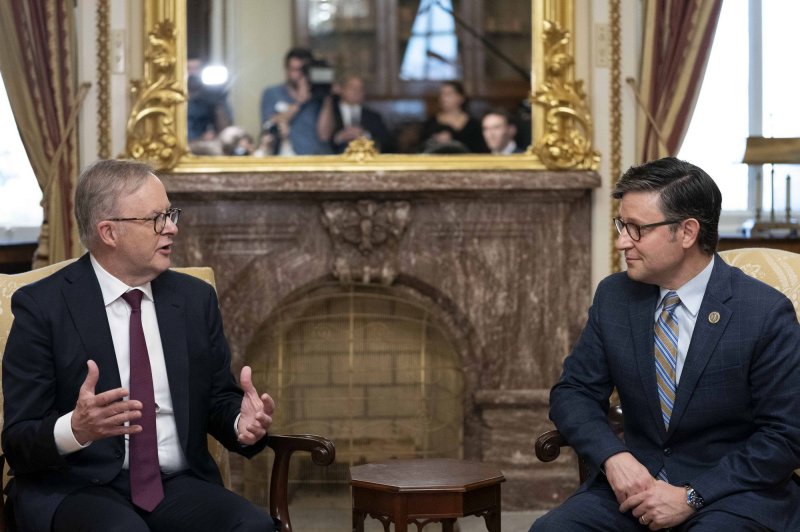
1 of 3 | Australian Prime Minister Anthony Albanese made the rounds on Capitol Hill during his state visit to Washington Thursday. Speaker of the House Mike Johnson, R-La., met with Albanese at the U.S. Capitol in Washington, D.C., on Thursday. Photo by Bonnie Cash/UPI | License Photo
Oct. 26 (UPI) — The United States and Australia marked a significant milestone in their long partnership with the signing of a bilateral tech agreement Thursday.
The assistant secretary for international security and nonproliferation at the U.S. State Department, C.S. Eliot Kang, and the Australian Ambassador to the United States, Kevin Rudd, signed the U.S.-Australia Technology Safeguards Agreement in an afternoon ceremony.
The agreement, endorsed by Australian Prime Minister Anthony Albanese and the Biden administration, provides the legal and technical framework for U.S. commercial space vehicles to launch from Australia.
The White House said in a statement that the agreement protects sensitive U.S. technology and data in Australia “consistent with our shared nonproliferation goals.”
United States Secretary of State Antony Blinken delivered remarks at the signing, welcoming the new space-related opportunities and investments in bilateral commercial space launch activities.
“American companies will have access to more high-quality launch sites so that they can increase the frequency of their operations,” he said. “They’ll be closer to the equator, where the earth spins the fastest, so their rockets can get an extra boost and use less fuel. And of course, Americans will gain some brilliant Australian colleagues.”
Blinken emphasized that by creating fresh opportunities for the private sector, both nations will further their dedication to fostering well-compensated employment on a bilateral scale.
“Whether they’re using satellites to make GPS navigation more accurate, or developing spacecrafts to study the universe, these companies will help shape the future for our people and for our planet for decades to come,” he said.
Prior to the signing, Albanese continued talks with the Biden administration at The White House, attending a luncheon hosted by both Blinken and Vice President Kamala Harris.
While in Washington, he also has reiterated the strong bond and decades-old alliance between the two nations as he made the rounds on Capitol Hill, further cementing the partnership.
During a joint press conference at the White House Wednesday Albanese said: “I regard the United States as a very reliable partner. It’s a relationship of trust.”
Albanese said during that press conference that Australia “unequivocally condemns the terror of Hamas” and added “respect for international humanitarian law is paramount.”
President Joe Biden hosted a state dinner for Albanese and 300 invited guests Wednesday night that the State Department said was to celebrate the “ever-expanding alliance” between the United States and Australia.
The wide-ranging Biden administration discussions with Albanese included enhanced collaboration on clean energy. Australia and the U.S. Department of Energy intend to establish an Australia-U.S. Clean Energy Industry Council to advise the respective governments on clean energy industry development and cooperation according to the White House.
The Biden administration said the Australia-United States Climate, Critical Minerals, and Clean Energy Transformation Compact launched in May is an example of the commitment to enhance climate and clean energy cooperation.
Also on the Albanese state visit agenda were defense and security concerns, particularly in the Pacific but also including Ukraine.
The visit will also help enhance a trilateral defense cooperation with Japan and collaborative combat aircraft cooperation between the U.S. and Australia, according to the White House.
The U.S. and Australia are also working to strengthen a secure supply chain of critical minerals, including materials vital to build batteries and electric vehicles.


